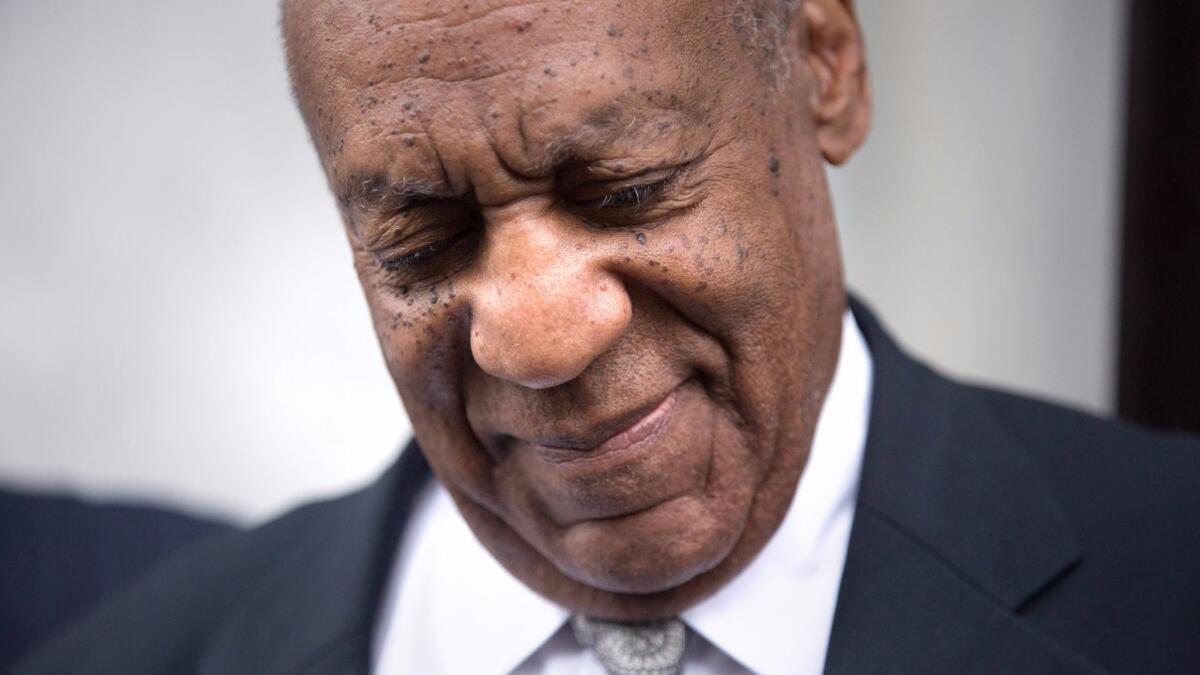Why Bill Cosby’s lawyers are feeling confident about his next trial

Reporting from New York — The prosecutor who went after Bill Cosby sounded confident Saturday when he vowed to retry the case, recalling what happened after his last mistrial. “I retried it and got a guilty verdict,” said Kevin Steele, the Montgomery County district attorney.
But replicating that result in the sexual assault case against Cosby will be an uphill climb, owing as much to luck as strategy. Cosby, who critics have said has skated by on his star power for too long, may once again have the inside track, many legal analysts said, because the prosecution may not have enough new tricks to win over jurors.
“The question for the prosecution is, what do you shuffle?” said David Rudovsky, a professor at the University of Pennsylvania who practices civil rights law. “There’s not a whole lot you can change from the original case.”
A jury over the weekend failed to reach a verdict on three counts of aggravated indecent assault against Cosby in an incident involving former Temple University basketball employee Andrea Constand. After deliberating for more than five days — nearly the same amount of time as the trial — jurors in the Norristown, Pa., courtroom told the judge they were hopelessly deadlocked on whether Cosby had drugged and molested Constand in 2004. Judge Steven T. O’Neill called a mistrial.
Steele’s quick pledge to retry, coupled with Constand’s promise to help him, heartened those who would like to see Cosby convicted. But their wish won’t be easily achieved.
The prosecution will look for ways to rejigger its case for the new trial, which O’Neill said he would like to start no later than October.
One key area will be the admission of witnesses alleging “prior bad acts” — that is, testimony from women who’ve accused Cosby of similar acts but who are unconnected to the Constand case. O’Neill had allowed just one to testify in the first trial, Kelly Johnson, and there is little reason to think he’ll change his mind this time around.
“I don’t know that they’ll win that. But it’s worth a shot,” said David Harris, a law professor at the University of Pittsburgh who specializes in race and the criminal justice system.
Prosecutors could also bring in more expert witnesses. In the first trial, they called just two — one toxicologist, who testified on the effect of pills Cosby gave Constand on the night of their encounter, and one sexual assault researcher, who testified about why Constand might have kept in touch with the defendant.
Judging by the jury’s questions, though, they did not seem to factor in to whatever was holding up a verdict during their deliberations — particularly the researcher, who was discredited on cross-examination because of an anti-Cosby Facebook post.
“I think the government should have two expert witnesses for every area,” said Dennis McAndrews, a former Pennsylvania prosecutor. “One expert can be more easily dismissed by a jury.”
Prosecutors could seek to change where the jury comes from. The Pennsylvania Supreme Court had ruled in this case the jury would be drawn not from the local area but from the Pittsburgh region, in response to concerns from the defense about how Steele’s pledge to prosecute Cosby had been a key issue in his 2015 campaign for district attorney.
The prosecutors could now argue that the publicity from the trial has eclipsed that exposure and that the jury should come from Montgomery County — a less diverse and more conservative place that could benefit their case.
The jury split in the first trial is not known. Only one juror has thus far stepped forward — an alternate who was not privy to deliberations. (He said he would have voted to convict.)
And details may not be forthcoming anytime soon. The prosecution and defense have come together on a motion asking that the jurors’ names not be released. O’Neill will hear arguments on the matter Tuesday.
A retrial is a chance for each side to correct problems and adjust strategy — a kind of postmortem with real-life results.
But the defense may have an advantage in what can be adjusted, because it mounted much less of a case. The prosecution called nearly a dozen witnesses, whose testimony lasted a week. The defense called just one witness, whose testimony lasted six minutes.
Lawyers for Cosby could make a renewed push for the judge to admit the testimony of Marguerite Jackson, a longtime Temple employee who has said Constand once told her of a plot to falsely accuse a Cosby-like figure as part of an extortion plot.
The judge rejected Jackson as a witness after Constand testified she didn’t know Jackson. But experts said the defense could make a new bid.
Cosby’s lawyers also could go harder after Constand, whom defense attorney Angela Agrusa sought to undermine on cross-examination primarily with phone records showing she maintained contact with the entertainer after the alleged assault.
“We have the better posture if they retry it,” Agrusa said Monday. “We have gotten to see the best of their evidence. They didn’t hold back.”
She said the defense might make a push to admit Jackson this next time and would even consider putting Cosby on the stand.
“You always have to maintain it’s a possibility,” she said, “particularly when you have a client who is as charismatic as Mr. Cosby.”
She said such a move was an option right up until the fifth day of the trial, when the prosecution closed its case.
“If we thought we were at risk [from a withering prosecution], we would have done it. Fortunately we didn’t get there,” she said.
For victims’ rights groups, a new trail is crucial, no matter the odds. They hope that making an example of the former sitcom star will embolden prosecutors in other cases to bring charges and future sexual assault victims to speak out.
“We’re ready whenever they are,” said Bebe Kivitz, Constand’s lawyer and an outspoken figure on sexual assault. She said her client had “done beautifully” on the stand.
But the fact that Constand testified so ably makes the road ahead even more daunting. The prosecution may have little choice but to bring back its key witness and hope the jury is somehow convinced the next time around.
“With this type of case, it all comes down to the credibility of the victim,” said Lisa Houle, a former Los Angeles County prosecutor who has been involved in numerous retrials. “And if the victim didn’t seem credible to all the jurors in the first trial, it’s hard to imagine them seeming magically credible the next time.”
But some do believe the prosecution will have certain advantages.
“Most defense attorneys are one-trick ponies. They have an element of surprise, which of course they don’t have on retrial,” McAndrews said. “And witnesses have been through the mill of cross-examination.”
And there is precedent for a celebrity being convicted on a retrial. The jury was hung in the initial Phil Spector murder trial in 2007, but another jury convicted the record producer 18 months later.
For now, Steele continues to push ahead — even if he’s not sure what will happen. “We’ll be geared up and ready to go,” he said Saturday. A moment later, he sounded more uncertain. “I guess stay tuned,” he said.
See the most-read stories in Entertainment this hour »
Twitter: @ZeitchikLAT
ALSO
Bill Cosby: A 50-year chronicle of accusations and accomplishments
Prosecutor vows to launch new sexual assault case against Bill Cosby following mistrial
More to Read
Sign up for Essential California
The most important California stories and recommendations in your inbox every morning.
You may occasionally receive promotional content from the Los Angeles Times.











